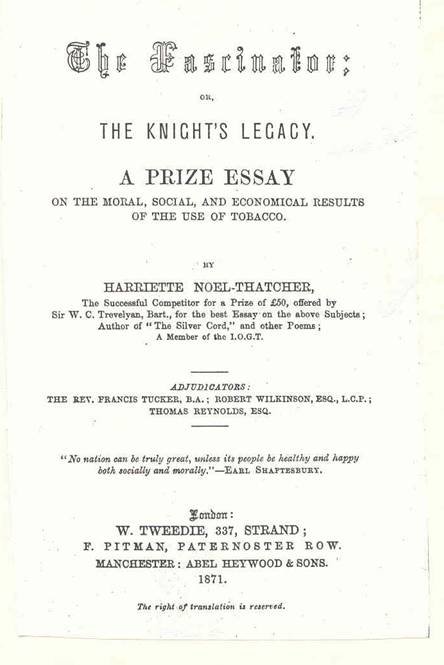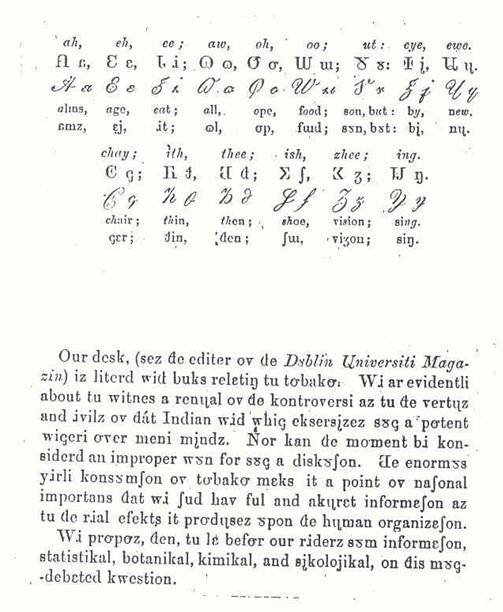
Having looked at the anti-drink lobby let us now turn to the anti-smoking lobby. According to Ms Noel-Thatcher tobacco and strong drink do for Christian England what idolatry and wine did for the ancient Holy Land. Alcohol is “the destruction that wasteth at noonday” and tobacco “the pestilence that walketh in darkness.” We are safe in assuming, then, that Ms Noel-Thatcher neither drank nor smoked, and that she wasn’t overly fond of anyone else who did. Incidentally, smoking and drinking are linked by Ms Noel-Thatcher and others because tobacco is thirst-creating and therefore invites drinking. For every reclaimed drunkard, she argues, tobacco makes ten more.
Section I of The Fascinator is devoted to “the Moral Results of Tobacco Usage”, beginning with the reasons for the decline in male attendance at Church of a Sunday morning:
“The majority of our working men are found each Sunday morning – waiting for their God, – at least, for their inferior deity Strong Drink; – their god supreme they hold fast clenched between their teeth. Near most suburban public-houses is an idle corner, the Sunday-morning rendezvous of labouring men, attired in their badge of toil, their working dress; for in them is evinced in an inverted form Whitfield’s maxim, Cleanliness is next to Godliness. These groups of idlers, who would feel it an infliction unendurable to wash, dress, and be seated in the Lord’s House at eleven o’ clock on the morning of the Lord’s Day, will yet loiter round these corners hour after hour, beguiling their tedium with the short dirty clay pipe, filled with their execrable ‘shag’, as if each power of soul and body were concentrated upon the grand project of warming up the olfactory organs, while ever and anon they tessellate the pavement with the valuable fluid which should assist digestion, to the discomfort of the female pedestrians passing to and from their respective places of worship. The leaden eye, the slovenly gait, the broken or desultory conversation, interlarded with coarse jokes seasoned with profanity, tell how these men are demoralised – imbruted.
But as the swine knows its feeder and eagerly turns to the trough on his appearance, so do these poor besotted ones, upon hearing the creaking of that tempting, swinging door, the rattling of those no longer obstructing shutters, flock to their idol-temple. Yes! – to use the words of Sacred Writ – they are all waiting for him – alcohol – their god!”
This is followed by a declamation against tobacco-selling on a Sunday: “the trim window of the tobacco vendor decoys our male population into violating the laws of God.” Then comes a dissertation on the effects of tobacco smoking on children – England’s future men: “the first cigar that a young man puts into his mouth is often the first step in a career of vice.” Lest the reader doubts this last statement, Ms Noel-Thatcher adduces some statistics: at the reformatory of Blackley, near Manchester, “out of fifteen boys who were admitted after its opening, twelve had been smokers, eight chewers, and ten confessed that they had stolen tobacco, or money with which to buy it.”
Indeed, our author is a lady very much in favour of a few statistics. Elsewhere she tells us of an evening ramble in Regents Park when two out of every five male passers-by were smoking. Another survey, just outside Gower Street Station yielded eight out of nine!
What really riled Ms Noel-Thatcher, though, was the smoking clergyman. Apparently this gentleman had publicly stated that he couldn’t cobble together a decent sermon unless he smoked. Our author’s reply to this was quite simple:
“For the mental eye to attempt to gaze on the Sun of Righteousness, through the medium of tobacco, is like looking at the natural sun through smoked glass: the glory is eclipsed.”
For Ms Noel-Thatcher the smoker was, quite literally, only one step removed from the opium addict. “In how many smokers is the MAN dead ?”, she asked, “slain by narcotic poison!”
Nor was it just smoking. Of chewing tobacco, she wrote:
“If inhaling the vapour of the burnt narcotic weed be, as it assuredly is, an offence against the physical and moral laws of God in our nature; if the practice be dirty, offensive to others, a snare and a delusion to those practising it, in what words can the habit under consideration be described?”
Apparently someone once argued that Lord Byron chewed tobacco, and that he was a genius. Ms Noel-Thatcher’s rejoinder to this was quite simple: being a genius was no excuse!
Next comes that other form of tobacco usage, snuff-taking. “Smoking is offensive,” Ms Noel-Thatcher wrote, “and chewing loathsome, but the odiousness of snuff-taking is not describable by any epithet.” I am not sure why she thought this, but she goes on to tell a story to elucidate: an Englishman once offered a South-Sea Islander the use of his snuff-box. “My lord, I thank you,” he replied, but my nose is not hungry.” Unfortunately, I am not at all clear what the moral of this story is supposed to be, but I repeat it so that my readers can at least have the chance to work one out for themselves.
Ms Noel-Thatcher was appalled that here – in England! – women were adopting the repulsive practice of snuff-taking, “while on yonder continent”, she went on, “it is reported that women have been known to become maniacs from the employment of the dusty preparation.”
Smokers – and tobacco users generally – ask why, if tobacco is so evil, God created it in the first place. Our author’s reply to this is neat: “the Lord sends food and Satan sends cooks.”
So ends Section 1 of The Fascinator. Section 2 deals with “the Social Results of the Use of Tobacco.” Actually, it isn’t significantly different from Section 1. Thus:
“Socially considered, the pipe shares with the glass the credit of introducing to English hearts and homes more wretchedness and desolation than all the other ills common to humanity.”
Thus there is violence from drunken, narcotic-crazed husbands, and, on a different front, smoking, then as now, posed a definite fire-risk. The smouldering pipe could start a house-fire, and Ms Noel-Thatcher cites an instance where a colliery explosion was caused by a thoughtless smoker.
Not only that, but smoking is a waste of money and a waste of God’s precious time, for, as our author points out, if it takes twenty minutes to smoke a pipe or cigar, and the smoker has three a day, then that amounts to 365 wasted hours per year. One can’t argue with statistics like that. Our author goes on:
“Immorality in the shape of smoking robs, as has been seen, the mental man, robs the social man, robs man physically – ay, and robs the State – robs it of athletic men capable of fighting bravely the battle of life.”
After Section 2 Ms Noel-Thatcher launches into a lengthy Conclusion, full of fiery rhetoric:
“By all the physical evils entailed upon fallen humanity as the guardian of the drug – the darkened eye and deafened ear, obscuring and closing those avenues to the soul; by cancerated lip and tongue; by palsied brain and limb; the palpitating heart; the sore vexed viscera that knows no ease from poison rioting in every part; by stunted mental excellence and blunted moral perception – Abjure the drug!
By all the puerile, vain excuse that pleads so fondly for the enslaving thing; by all the clamouring of the appetite for ‘weed’, the thirst for fiery drink – created by Narcotic! – by all the wild fancies, the hideous forms, the ghastly spectacles haunting the hopeless inebriate, the victim of delirium tremens – Abjure the drug!”
Another two and a half pages of such impassioned pleas brings Ms Noel-Thatcher to conclude her tract thus:
“By all the long, long train of myriad ills stalking in fell TOBACCO’S wake, as ye would joyous stand at Heaven’s Assize, when the dread books shall open lie the great white throne before, and we shall give account unto the all-seeing Judge of ‘deeds done in the body’, we adjure you as we write farewell – Renounce the drug!
Awake, awake! And shake you from the dust, and captive lead captivity, oh Britain’s choicest sons; put on strength, and gird you to the holy war; and to the death be this your battle-cry – ABJURE THE DRUG!”
Readers who are exhausted by all this, and in urgent need of a cigarette and a double whisky, might prefer to look up A Smoking Tract (no author is given) which appeared originally in the Dublin University Magazine for September 1871, but which was reprinted and widely circulated by the North of England Anti-Tobacco Society. Its oddity lies in the fact that it is printed in phonetic orthography, “in the hope that the novelty of the dress will be an additional inducement to its perusal.” Phonetic orthography uses the ordinary letters of the English alphabet plus sixteen others. This produces an alphabet which can represent every sound in the English language, thus spelling the language as it is spoken. The sixteen new letters are shown here, together with the opening paragraph of this curious little tract:
